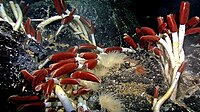
Photo from wikipedia
The gut microbiome is one of the most important sites of host-microbe interactions, however, mechanisms governing the responses of host-associated microbes to changing environmental conditions are poorly understood. To address… Click to show full abstract
The gut microbiome is one of the most important sites of host-microbe interactions, however, mechanisms governing the responses of host-associated microbes to changing environmental conditions are poorly understood. To address this, we investigated individual and combined effects of dietary changes and increase in salinity (from freshwater to salinity 3) or antibiotic concentration on the gastrointestinal bacterial community of the aquatic snail Ampullaceana balthica. In parallel, the energy reserves of the host were quantified. A change of natural food source to biofilm forming green algae Scenedesmus obliquus as well as the combined treatment of salinity and S. obliquus decreased the richness and changed the composition of the A. balthica gastrointestinal bacterial community. In these treatments Pseudomonas became the dominant bacterium. However, energy reserves of the host were higher in these treatments compared to the reference aquaria specimens and the combined treatment of antibiotics with S. obliquus. Obviously the presence of antibiotics inhibited the dominance of Pseudomonas, and resulted in lower energy reserves despite S. obliquus feeding. Therefore the host seems to be able to adapt and replace its bacterial community composition to respond to mild changes in salinity and food source. Antibiotics in the water can disturb this self-regulating mechanism. Our study underlines the ability of aquatic macroinvertebrates to respond to sudden changes in food source and mild shifts in salinity. Moreover, it emphasizes the strong impact of the food source on the gastrointestinal microbiome and the importance of generalists during disturbance.
Journal Title: Molecular ecology
Year Published: 2022
Link to full text (if available)
Share on Social Media: Sign Up to like & get
recommendations!